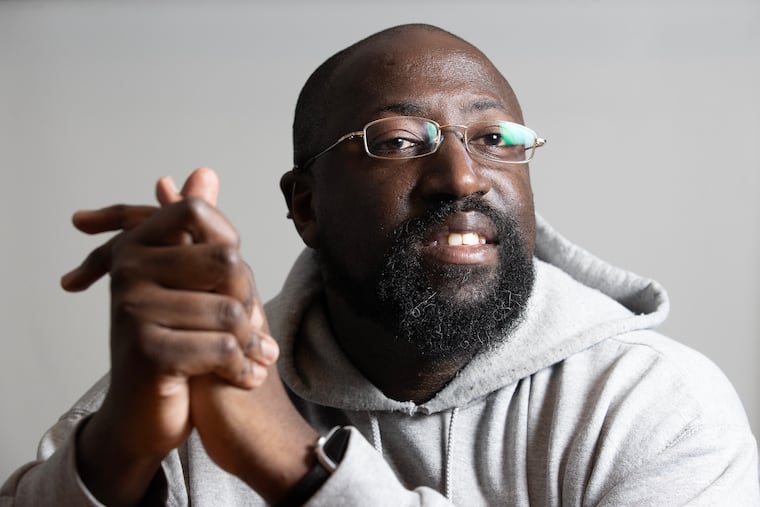We asked a Philly polyamory coach all our burning questions
“Not everybody is a married couple looking for the hypothetical hot bi babe,” said Kevin Patterson.

The practice of polyamory, or maintaining multiple romantic and sexual relationships with the consent of everyone involved, is having a moment. In the media alone in January, four cats cuddling graced the cover of New York Magazine, teasing “a practical guide for the curious couple,” while countless articles featured the New York Times best-selling book, More: A Memoir of Open Marriage, by Molly Roden Winter.
Polyamory was once relegated to the fringes of romantic life; now little more than 10% of all U.S. single adults reported a personal experience in 2021, according to the Kinsey Institute.
Kevin Patterson, of Chester, is a 20-plus-year veteran of a non-monogamous life who works as a polyamory coach in Philly. (He also has a day job as a technical writer.) He is the author of the 2018 book, Love’s Not Colorblind: Race and Representation in Polyamorous and Other Alternative Communities. He guides and advises people who are facing unexpected challenges or who are new to consensual non-monogamy (he uses the term interchangeably with polyamory).
Patterson, 45, is married with two children, and is deeply involved with three other partners in the city. He also has a variety of other casual relationships.
We asked him about what people misunderstand about polyamory, how to come out to friends and family, and what to tell kids. The following conversation has been edited and condensed for clarity.
What does a polyamory coach do?
A lot of what people understand about relationships comes from pop culture, or parental modeling, or Disney movies. In terms of consensual non-monogamy, a lot of us are charting our own paths. Most of us are learning as we go along.
For me, it’s all about autonomy, respect, and communication. That sounds really simple, but that’s something that a lot of us don’t have. As a coach, it’s helping people put out their best selves.
How has the non-monogamous community changed since you first joined?
It’s a lot more colorful. When I started in the local area, I felt like my wife and I were some of the only Black people involved. That ended up changing.
If you’re looking at an activity or a community and it looks all white, it becomes really easy to write yourself out.
Are the biggest hurdles to successful polyamory different than what people in the mainstream might think?
Yeah. People think that the biggest hurdle is going to be jealousy, when really, it is communication. The biggest concern ends up being something more like: “I’m feeling inadequate around my partner.” Maybe them having multiple partners will spotlight that.
But the resolution isn’t getting rid of the other partner. The resolution is making your needs known, or getting the reassurance you need, or scheduling intentional time to spend together. It’s not, “Oh damn, you went to a movie with your other person and I’m upset.” It’s: “I wanted to go with you to a movie.”
Why do you think people are talking about polyamory more now?
I think the representation is changing a bit. I think it’s also younger people ―they’re figuring out exactly what it is that they want to do and examining all their options.
Also, we have the internet now. When I started dating, we didn’t. Today if I’m like, ‘I want to be a furry,’ I can go online and find 1,000 furries, who will validate my identity and my existence.
What do you think the media gets wrong about polyamory?
I mean, short of everything?
They make it so much more salacious than it really is. It’s sensationalized in such a ridiculous way. Maybe 10% of my life is as wild as the media would portray. But the other 90% is just regular family stuff. I’m a married man. I’m actually driving over to my kid’s school to pick her up right now. I work an eight-hour day. It’s just that sometimes there are more people involved.
Not everybody is a married couple looking for the hypothetical “hot bi babe” to come and live with them and sleep in the same bed.
What advice do you have for people thinking about coming out as polyamorous to friends and family?
Go in knowing who you are and what you want. Because we’re doing something unconventional, there’s always going to be people who think that by bringing it up, you’re looking to be talked out of it, or that you’re having a problem they can solve.
That’s what happened with my parents. I was just letting my mom know what was going on with me. And what she heard was, “Mom, I’m having a problem, can you help me?”
How do you advise people who want to talk to their kids about it?
I was lucky. My kids were young. So all of our conversations were just like, “Hey, our family’s a little bit different. And this is why and this is why it’s OK.”
For parents talking to older kids, you’re not asking for permission. You’re giving them information. I had a pair of friends who, when they told their 16-year-old daughter that they were polyamorous, the daughter had spotted the extra humans around and thought they were just cheating on each other. She didn’t have the context to process it.
You can give your kids that context.